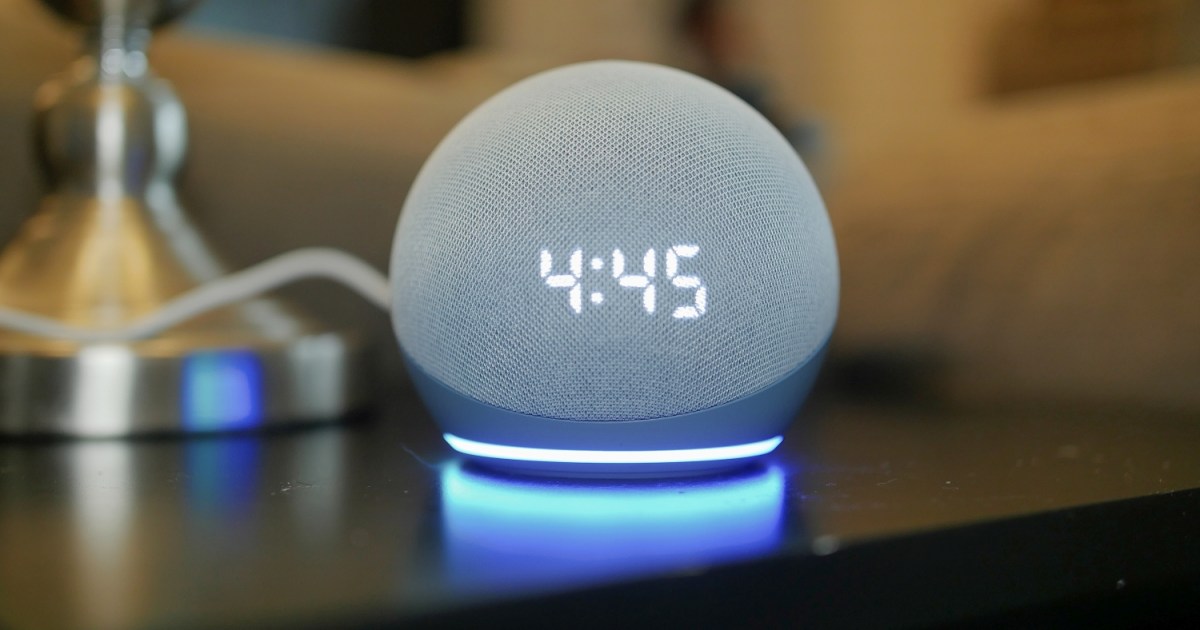Smart speakers are an integral part of any smart home, often serving as the brains of the entire operation. Beyond pumping out impressive audio or giving you updates on the morning news, smart speakers can listen to voice commands before passing out instructions to the rest of your gadgets. Functionality varies widely by product, making it important to find the best smart speaker for your setup.
Thankfully, it’s hard to pick a dud in today’s loaded marketplace. Whether you’re an Apple loyalist, a Google enthusiast, or an avid user of Amazon Alexa, just about every big tech company is churning out incredible smart speakers. But if you need some help narrowing down all your options, here’s a look at the best smart speakers of 2023.

Simon Cohen / Digital Trends
Sonos Era 100
The best smart speaker
Pros
- Big, expansive sound
- Bluetooth now built-in
- Optional analog line-in
- Super-easy room tuning
Cons
- No Google Assistant option
As the successor to the Sonos One (our previous best smart speaker), it should come as no surprise that the Era 100 is just as easy to recommend. Everything that made the Sonos One popular has been improved with the Era 100 – including sound quality, usability, and the addition of native Bluetooth support.
The Sonos Era 100 produces booming sound thanks to its twin angled tweeters, a woofer that’s 25% larger than the Sonos One, and custom waveguides that help send noise to all corners of your room. It also features a faster processor, which results in better performance when giving it commands.
Interacting with the device is more streamlined than it was on the Sonos One, which used gestures and touch controls on the top of the device. For the Era 100, you’ll get simple buttons for everything from volume controls to track selection.
It’s still expensive (typically retailing for $249), but there’s no doubt it’s a premium smart speaker that should appeal to even the most discerning audiophile.

Sonos Era 100
The best smart speaker
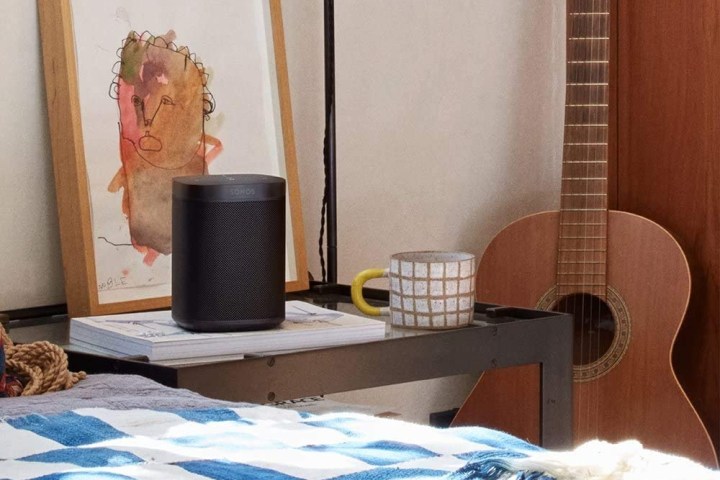
Image used with permission by copyright holder
Sonos One (Gen 2)
The best smart speaker (Runner-up)
Pros
- Excellent compatibility with services and voice assistants
- Great sound
- Bluetooth 5.0
Cons
- Expensive for a smart speaker
The second-generation version of the Sonos One is even more user-friendly, with an updated design that adds touch controls and incorporates Bluetooth 5.0 for a variety of connection options. Its core features still remain, however, including the ability to choose between Alexa or Google Assistant and to link with other Sonos speakers through Wi-Fi to fill the room with even more sound.
The speaker’s far-field microphone array effortlessly hears voice commands from across a room, even when music is playing. If you have qualms about privacy, Sonos claims that muting the microphones is done via hardware, ensuring that when the mic indicator light is off, the speaker is definitely not listening. With AirPlay 2, you can stream any audio from an Apple device directly to the speaker or to any other Sonos speaker in your home.
But our favorite aspect of this model is simply the fact that it’s a Sonos speaker. The Sonos wireless whole-home music system remains the very best we’ve ever tested. It has support for almost every major music streaming service, and it’s all controlled from an app on your phone, tablet, or PC. Not only is the app full of great features like Apple Music playlist compatibility and the ability to group multiple speakers, but these features are also remarkably easy to use.
Thanks to Sonos’ partnership with Ikea, there’s also a growing ecosystem of cool third-party devices that can be used to control the Sonos One and any other Sonos speakers in your home. The Sonos One (Gen 2) is a fantastic speaker and a great way to smarten up your home.
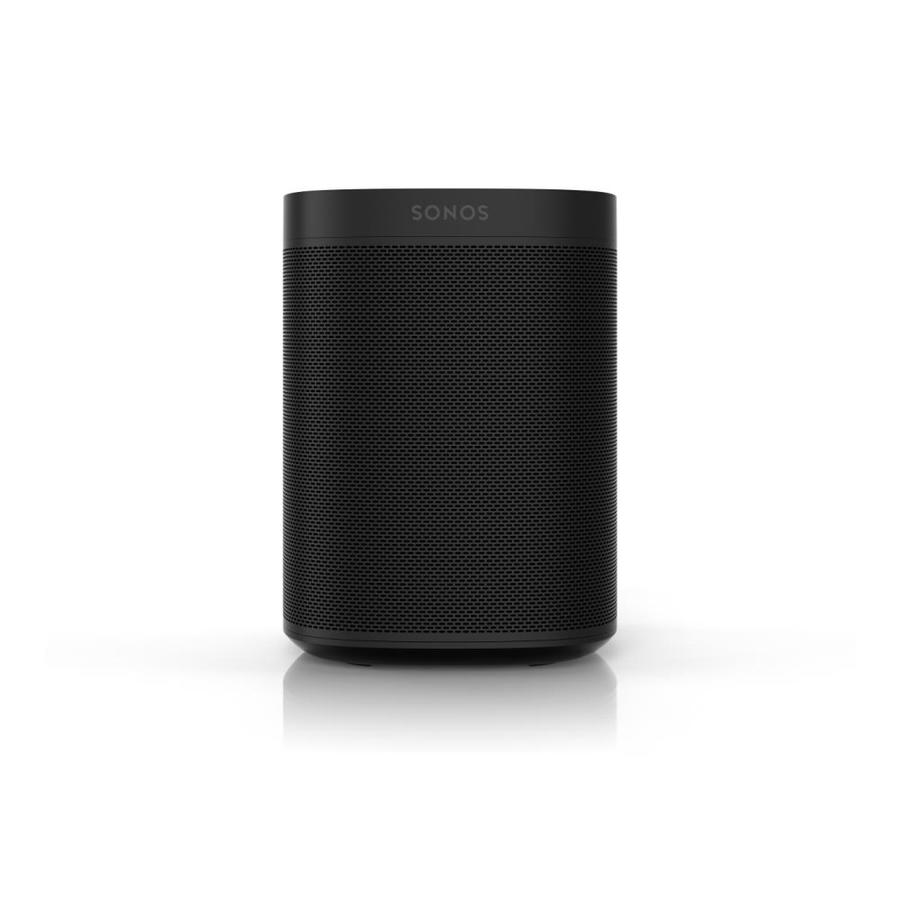
Sonos One (Gen 2)
The best smart speaker (Runner-up)

Image used with permission by copyright holder
Amazon Echo Dot (5th Gen) with Clock
The best budget smart speaker
Pros
- Re-designed for better sound quality and deeper bass
- New touch controls and brighter display
- Built-in Eero technology
Cons
- Eero features will go to waste without the right network
The 4th-gen Amazon Echo Dot already upgraded the design to an orb that matched the larger flagship Echo and greatly improved the sound of the speaker — but Amazon outdid itself with the 5th-gen model and the host of smart features it contains.
Alexa is fully supported, of course, and those little speakers do an incredible job of filling a small space with sound. The clock version (not necessary but nice) is especially well-suited for an office desk or a bedside table — and onboard controls include privacy switches among other benefits. Plus, as is tradition, there are kid versions of the speaker, this time with owl and dragon skins.
Amazon also added even more useful technology to the 5th-gen model, including a higher-resolution display, and new accelerometer and temperature sensors to provide more information about your surroundings. There’s a new chip also for tap-based controls (all the better for an alarm clock), and it now has Eero tech built in, allowing it to connect with an Eero router to help extend it
The most appealing part about the Amazon Echo Dot (5th Gen) with Clock is its price. At $60, it’s easy on just about any budget — meaning you can buy multiple units without forking over a huge sum of money! And who doesn’t like that?
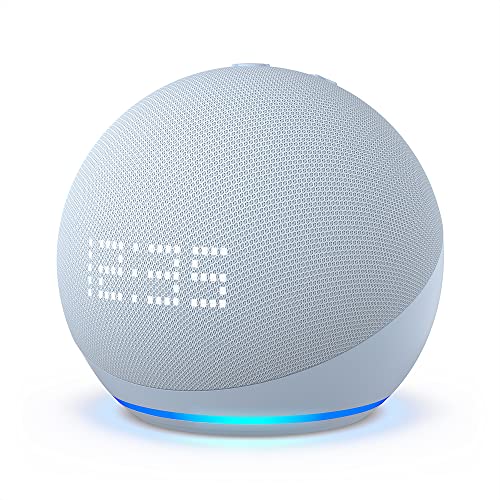
Amazon Echo Dot (5th Gen) with Clock
The best budget smart speaker
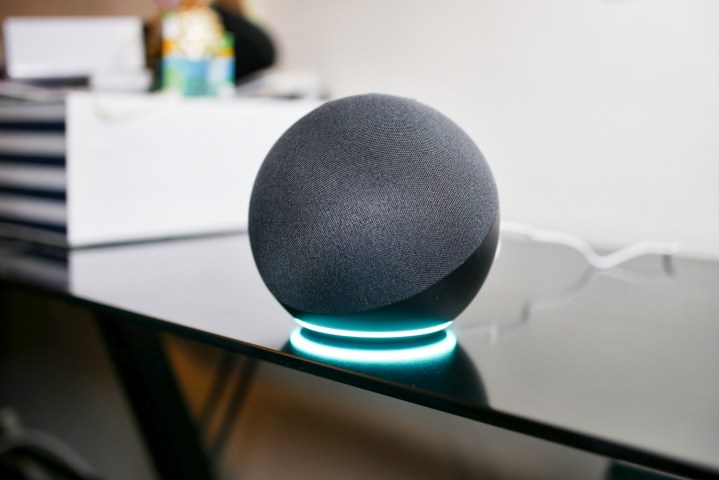
Image used with permission by copyright holder
Amazon Echo (4th Gen)
The best smart speaker for Amazon Alexa
Pros
- Charming new spherical design
- Dazzling LED light ring
- Acts as an Amazon Sidewalk Bridge
- Great sounding audio
Cons
- Bass strains at highest volume
The larger, spherical design of the 4th-gen Echo doesn’t just look cool and modern. It also packs a set of speakers specializing in 360-degree sound designed for larger areas, filling spaces with tunes or other audio while listening for voice commands from across the room.
Of course, it’s a wonderful centerpiece in the living room if you’re planning to entertain guests, like a speaker in the kitchen for music, and so on. Other features like a 3.5mm auxiliary jack, Bluetooth, and stereo pairing round out its audio features. When it comes to controlling the smart home, the Amazon Echo (4th Gen) can be used to turn off lights, check up on calendar appointments, and order pizza.
Meanwhile, it can also monitor your home while you’re away by sending you notifications if it hears the sounds of smoke alarms with Alexa Guard. You’re getting a rich smart speaker in terms of performance, and features with the Amazon Echo (4th Gen).
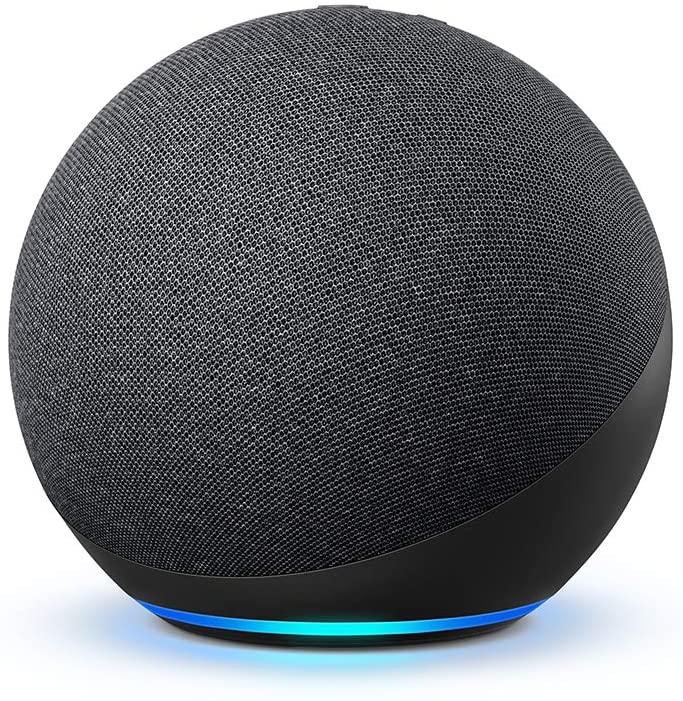
Amazon Echo (4th Gen)
The best smart speaker for Amazon Alexa
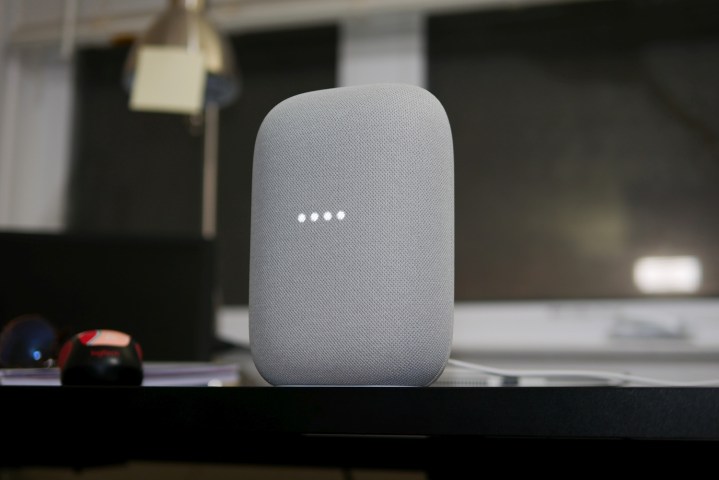
John Velasco / Digital Trends
Google Nest Audio
The best smart speaker for Google Assistant
Pros
- Superb audio performance
- Charming design for any decor
- Adapts audio quality to any room
- Attractive $100 cost
Cons
- Dense weight
- Too complacent with feature upgrades
Google Nest Audio plays to a wide range of people because it brings that perfect mixture of intelligence and raw power.
What’s apparent is that it’s a substantially beefier speaker than the Google Home — aided by its 19mm tweeter and 75mm mid-woofer. The result is a Google Assistant-powered smart speaker that roars with incredible power. There’s no denying that it’s far more equipped at playing music than its successor, just because it’s 76% louder and has a 50% boost in bass.
You can also pair it with another Google Nest Audio for stereo sound, plus you can group multiple speakers in other rooms to play your tunes everywhere — while being harmoniously in sync. The best part of Nest Audio is that you’re not paying a fortune for premium audio with its $100 sticker price. It’s affordable, packs all the intelligence of Google Assistant, and even delivers impressive sound.
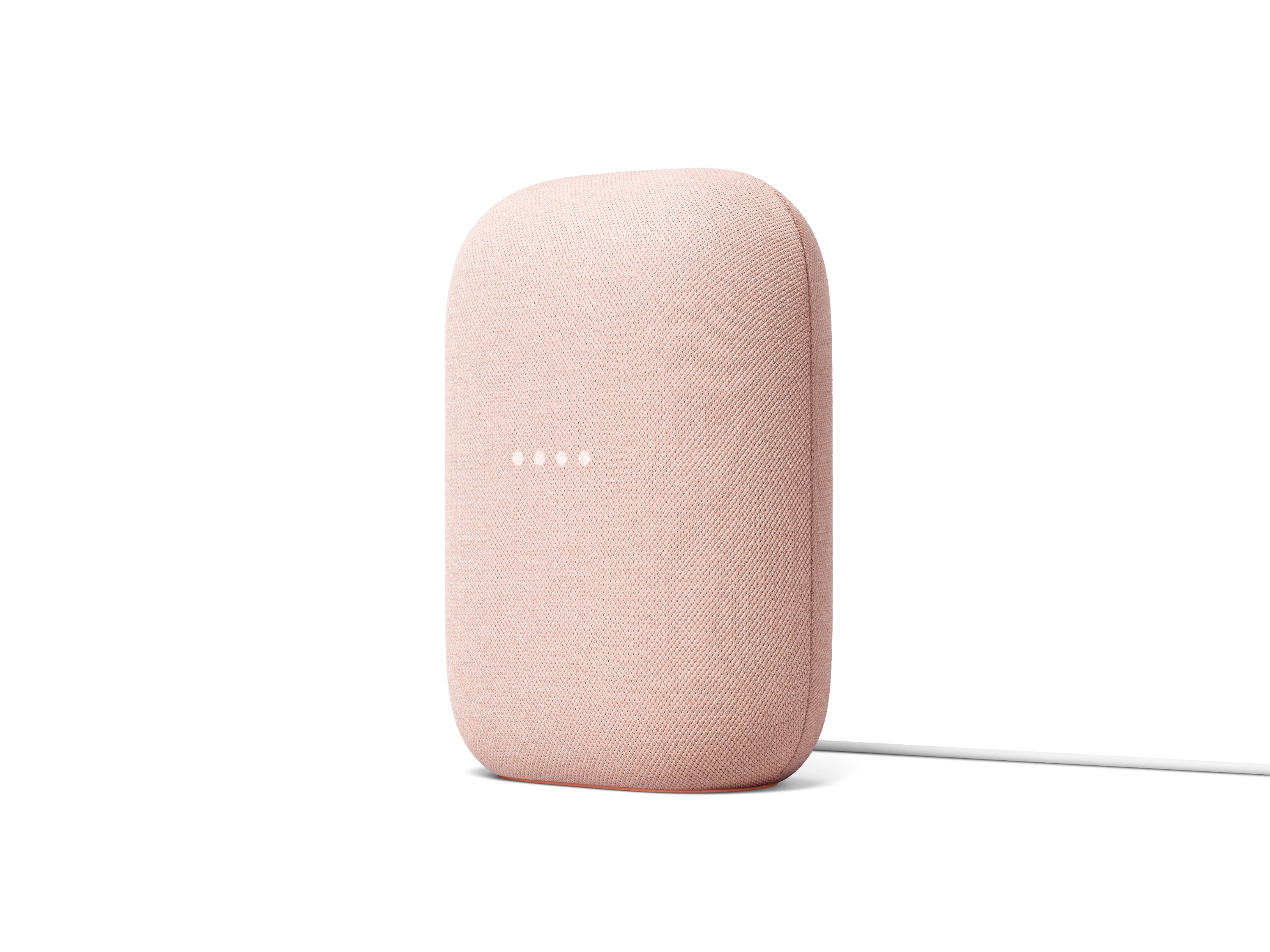
Google Nest Audio
The best smart speaker for Google Assistant
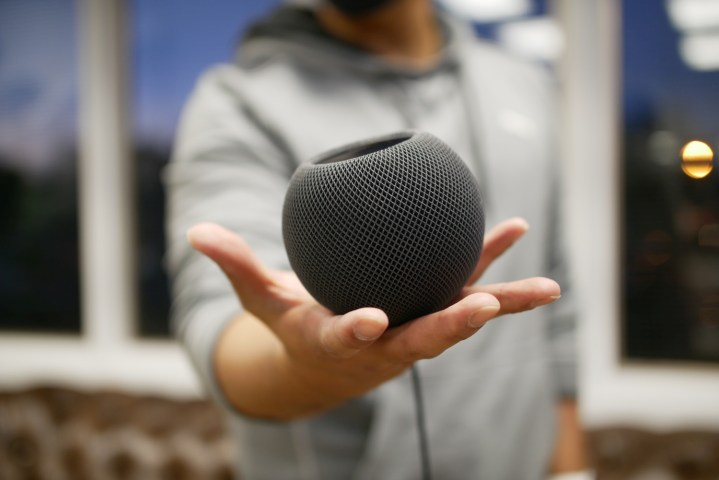
John Velasco / Digital Trends
Apple HomePod Mini
The best affordable smart speaker for HomeKit
Pros
- Computational audio optimizes the experience
- Clean-sounding highs and mids
- Compact size makes it discrete
- It’s the most affordable HomeKit home hub
Cons
- Siri lacks the advanced intelligence of its competitors
- Short power cord
Apple certainly learned how tough it can be to complete in the smart speaker space. While its HomePod faced stiff competition when it launched, its sibling in the HomePod Mini fared much better. Part of that reasoning is that the HomePod Mini was cheaper, while still offering excellent audio performance.
Apple users will appreciate the HomePod Mini in the home because Siri can be leveraged on the speaker to accomplish a number of things, such as turning on the lights, unlocking the door, and much more. When it comes to audio, there’s still a lot of power behind its compact design — but what’s impressive is its ability to adapt to whatever it’s playing. For example, if you’re watching a movie on your television and using the HomePod Mini as your audio source, it’ll tune the audio accordingly so that dialogue won’t be drowned out by the sound effects in the background.
Speaking of home theater experiences, you can achieve that by pairing two HomePod Mini speakers together. In fact, you’d be surprised by how well it sounds compared to a traditional soundbar.
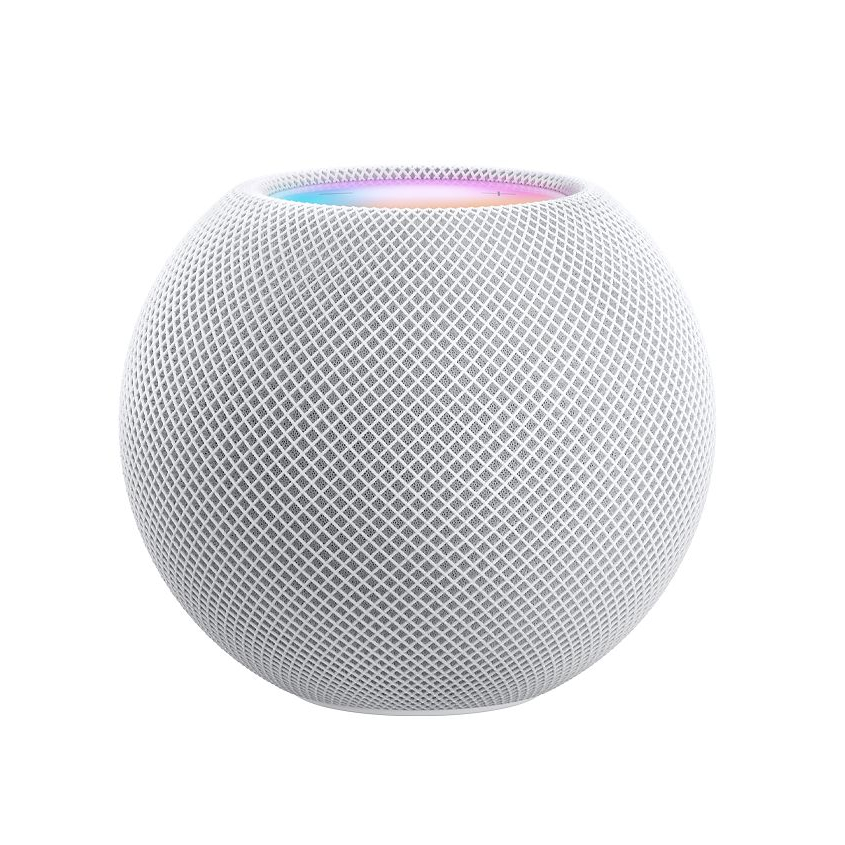
Apple HomePod Mini
The best affordable smart speaker for HomeKit
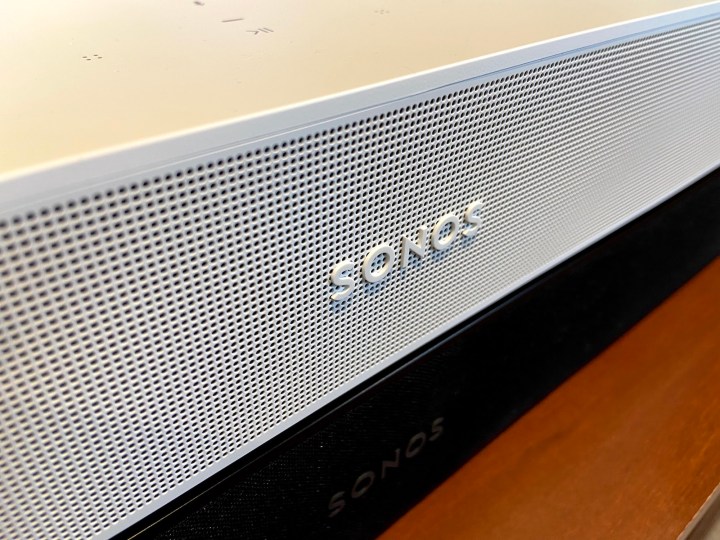
Simon Cohen / Digital Trends
Sonos Beam (Gen 2)
The best smart speaker for TV
Pros
- Easy setup
- Immersive, room-filling sound
- Sleek design
- AirPlay 2
Cons
- No HDMI inputs
- Requires compatible TV for Dolby Atmos
Even the best TVs typically have lousy sound quality due to their tiny built-in speakers, which makes soundbars an attractive option for many. However, there are a lot of soundbars and not all of them are as smart as the modern home theater needs. That’s where this excellent iteration of the Sonos Beam steps up.
A compact and well-styled bar, it can easily fit under the smallest of TVs on either a console or on the wall using the optional bracket. Like every Sonos product, it has impressive sound quality for its size and can become part of a much larger multiroom audio system. The Gen 2 model is further improved with the addition of Dolby Atmos, an important part of home entertainment audio these days. The Sonos app lets you stream from virtually every music service on the planet and it does an excellent job managing your private music collection, too.
But the reason we’ve chosen the Beam for this roundup is its smart speaker chops. With the ability to run either Google Assistant or Alexa as its voice assistant, it can serve as the hub for a host of home automation commands. It can translate spoken commands for Google Assistant or Alexa into signals that control your TV. “Alexa, turn on Bedroom TV,” will do just that. Other commands, like “Alexa, turn the volume up on Bedroom TV,” work well too, as will similar commands for Google Assistant. You can also control the speaker with an app, or use it with Apple AirPlay 2.
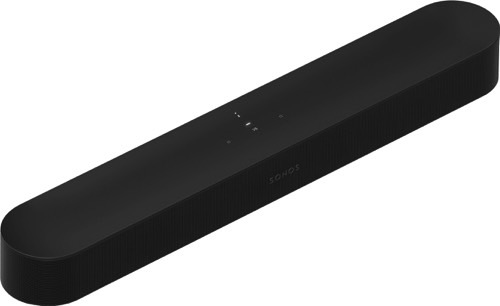
Sonos Beam (Gen 2)
The best smart speaker for TV
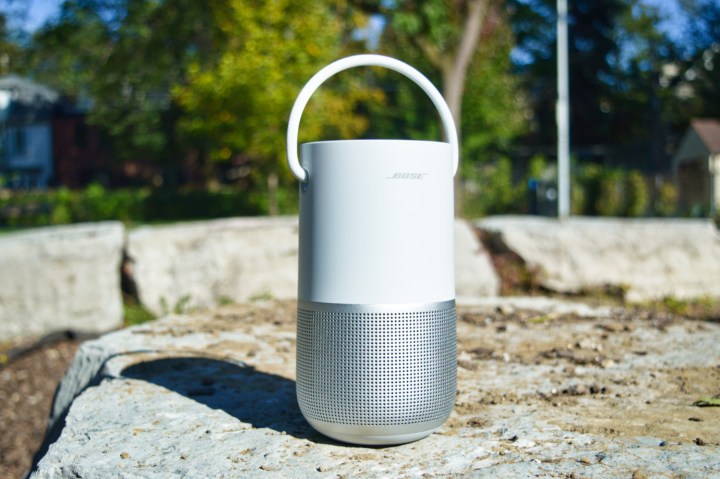
Simon Cohen / Digital Trends
Bose Portable Home Speaker
The best portable smart speaker
Pros
- Very portable
- High sensitivity mics
- Great 360-degree sound
- Alexa and Google Assistant
- AirPlay 2
Cons
- Limited app features
- Missing some midrange
- Not ideal for Android
You already know that we love the Sonos One for its ability to let you choose your preferred voice assistant. The Bose Portable Home Speaker gives you that choice too, plus a built-in rechargeable battery, carry-handle, and Bluetooth so you can take it with you anywhere you go.
Though considerably more expensive than the Sonos One, the Bose is the ideal choice for people who demand absolute flexibility. When at home and connected to your Wi-Fi network, the Portable Home Speaker is a full-fledged smart speaker that lets you talk to Alexa or Google Assistant. Using your voice to control music playback via Spotify works like a charm, but the Bose app gives you additional options like multiple speaker groupings. The app isn’t as good as the one Sonos provides, but as long as you don’t intend to build a whole-home music system using Bose speakers, we doubt you’ll mind.
While you shouldn’t let it fall in the pool, the speaker is protected from small amounts of water thanks to its IPX4 rating, so you need not fear the occasional unexpected rain shower.
Apple users will love the AirPlay 2 integration which lets you stream any audio — be it music from your favorite streaming service, or the soundtrack from a Netflix movie — directly to the speaker when connected to Wi-Fi. When on the road (or if you’re an Android user) the Bose Portable Home Speaker’s Bluetooth connection lets you keep the tunes going. With 12 hours of battery life between charges, those tunes can go on for most of a day.

Bose Portable Home Speaker
The best portable smart speaker
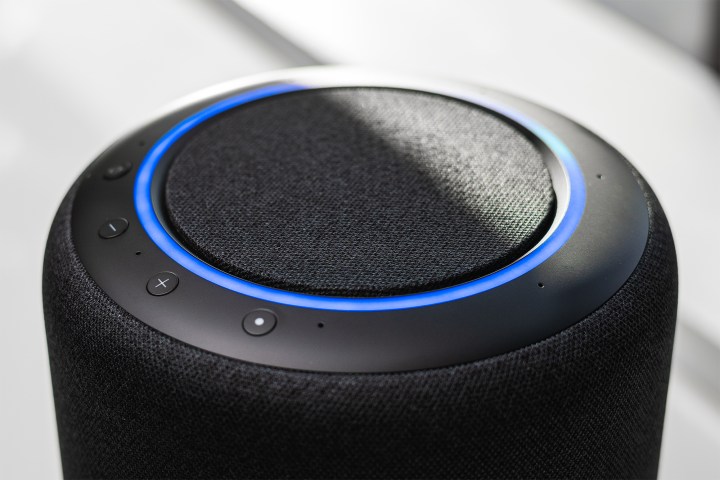
Image used with permission by copyright holder
Amazon Echo Studio
The best smart speaker for 3D sound
Pros
- Class-leading bass
- Slick and simple setup
- Dolby Atmos and 360 Reality Audio support
- Large, sprawling soundstage
- All the Alexa smarts
Cons
- Midrange occasionally muffled
- Brittle touch to lighter instruments
- 3D music still in limited supply
Though it bears a resemblance to the Apple HomePod with its cylindrical shape, the Echo Studio is, in fact, an entirely new breed of smart speaker. It’s still an Amazon Echo, which means that you get all of the benefits of being able to issue voice commands to Alexa to control everything from your music to your thermostat. But when it comes to audio, the Echo Studio is in a class of its own.
With the launch of the Amazon Music HD streaming service, Amazon is now a leading source of top-quality music. The service offers CD-quality audio and hi-res audio, as well as immersive 3D music tracks via Dolby Atmos Music, and Sony 360 Reality Audio. And for now, the Echo Studio is the only speaker on the planet that works with all of them.
CD-quality and hi-res audio are fairly easy to understand: They’re the best versions of stereo audio you can get. Dolby Atmos and Sony 360 Reality Audio are different. These two new formats expand your music into something far wider, deeper, and immersive — which is why we refer to them as 3D. The Echo Studio not only projects these formats around a room the way they were meant to be heard, but it also reinforces the sound with a clean and powerful bass response we simply didn’t expect from a speaker at this price.
The Amazon Echo Studio may not please all audiophiles — it tends to muffle some midrange sounds for stereo sound — but it is nonetheless a superb value and (at the moment) a unique smart speaker that leads a growing movement. Also, note that Amazon announced an update for Echo Studio firmware in 2022 to give it Amazon’s own spatial audio processing, designed to improve clarity compared to standard audio. You’ll need Amazon Music Unlimited to use it, but it’s a notable upgrade to the Studio’s sound options.

Amazon Echo Studio
The best smart speaker for 3D sound
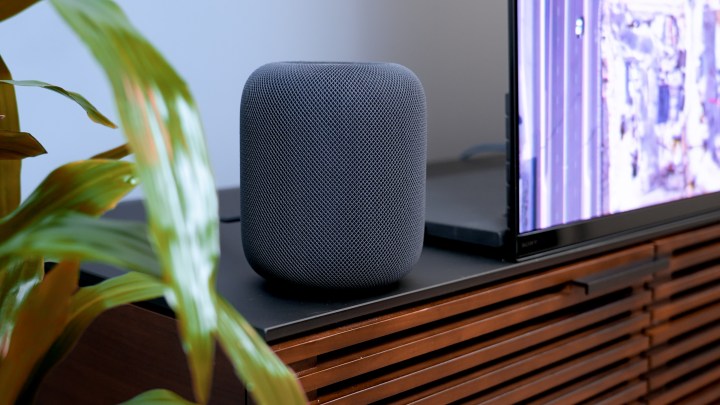
Zeke Jones / Digital Trends
HomePod 2023
The best smart speaker for HomeKit
Pros
- Great sound quality
- Incredible bass performance
- Dazzling Spatial Audio surround
- Plug and Play wireless
- Slick design
Cons
- Limited connection options
- No direct Spotify playback
If you love HomeKit but need something with a bit more power than the HomePod mini, consider opting for the new Apple HomePod. It offers all the same functionality as its smaller sibling, but thanks to its larger footprint, the HomePod is capable of producing loud, room-filling sounds. Inside the device, you’ll find a high-excursion woofer and an array of beamforming tweeters, which is just a fancy way of saying the HomePod sounds fantastic.
Another perk of the HomePod is its ability to optimize its sound for any room. Using Room Sensing technology and Spatial Audio with Dolby Atmos, you can rest assured your smart speaker is pumping out the best possible sound at all times. And if you want to fill your entire home with great sound, HomePod supports multiroom audio through AirPlay. It’s not cheap at $300, but no doubt you’re getting your money’s worth.
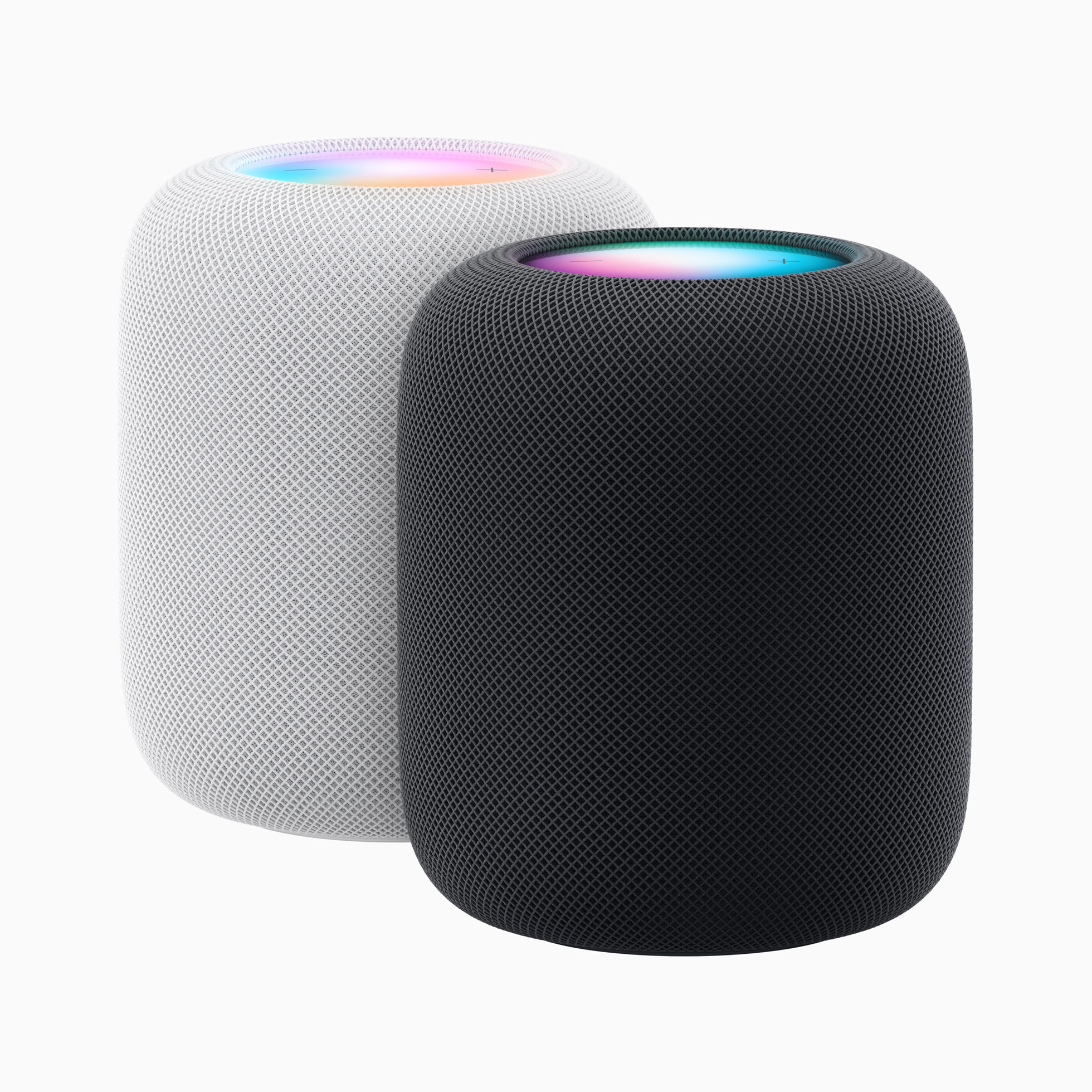
HomePod 2023
The best smart speaker for HomeKit
Frequently Asked Questions
Should I buy an Alexa smart speaker or Google smart speaker?
That depends on which ecosystem you like and use most. Both have their benefits and drawbacks, and both work with the most popular streaming services. Alexa tends to work with more smart devices, but this is becoming less of a factor with time. If you’re undecided, pick a smart speaker that gives you a choice like the Sonos One.
Do smart speakers help the visually impaired?
Yes, they have a lot of functionality that doesn’t require buttons, making smart speakers great for visually impaired people. They are particularly useful when paired with smart devices around the home that can be controlled via voice. Even without smart devices, these speakers can help make schedules, read the news, look up information, plan events, provide recipes to cook meals, and lots more — really putting the “assistant” in voice assistant.
Do smart speakers have an AUX input?
Some smart speakers, like the Marshall Stanmore II Voice, have 3.5mm inputs. If you need an AUX input, we recommend making sure the speaker has one before purchasing.
Can I use smart speakers to listen to FM radio?
No, most smart speakers do not have an FM tuner. If you want to listen to the radio, your best bet is to play an internet radio station on these speakers. Some services do turn FM channels into internet stations you can listen to on smart devices, like myTuner Radio.
Do smart speakers usually have a battery?
It’s not common. Batteries are more common on simpler Bluetooth speakers designed more for portability. If you want to take your smart speaker with you on the go, we recommend making sure it has a built-in or add-on battery (like the Bose Portable Home Speaker).
Do smart speakers need Wi-Fi?
Yes, smart speakers generally need Wi-Fi to set up and use. You can access some features with Bluetooth, but a Wi-Fi connection is still needed for the smart speaker to operate.
Are smart speakers always listening to me?
Yes and no. After some initial hiccups, smart speakers typically work like this: The mics are always listening for their wake word, like, “Hey, Alexa.” But they don’t recognize or record anything else. Once they do hear the wake word, they listen to the speech after it to interpret the request. That command is typically recorded, but settings in apps like Alexa allow you to stop the speaker from storing the command in the cloud, or make sure it’s deleted soon afterward. Smart speakers also come with physical mute buttons that will shut down the mics entirely if you don’t want them on.
Can children use smart speakers?
Today’s smart speakers have voice profiles so each person in the family can create their own profile with their own preferences. You can also use apps to set controls, such as disabling any music with profanity, etc. That being said, there have been cases of kids using smart speakers to order things online (100 gallons of ice cream, etc.) or otherwise getting into trouble, so it’s a good idea to limit what they can do.
Can all my devices work with a smart speaker?
Compatibility has long been a problematic part of smart platforms that power smart speakers and other devices. In past years, it’s been a tug of war between brands to get third-party smart devices to support their own voice assistants and apps, so you may have a device that works on Alexa but not with Google Home, and so on. Alexa has generally done the best with third-party support, followed by Google, then Apple’s HomeKit and Home app.
That’s starting to change and change quickly. The big three smart brands, along with a wide variety of other tech companies, banded together and created a new smart home protocol to work on all their platforms, called Matter. These days, you can look for the Matter logo or check to see if your devices are backward compatible with Matter and rest easy. Older devices, however, may still have limited compatibility, so you may have to do some extra research.
Editors’ Recommendations

